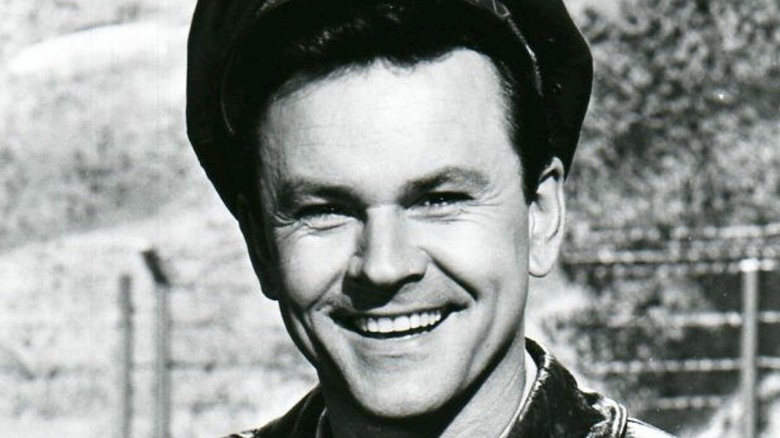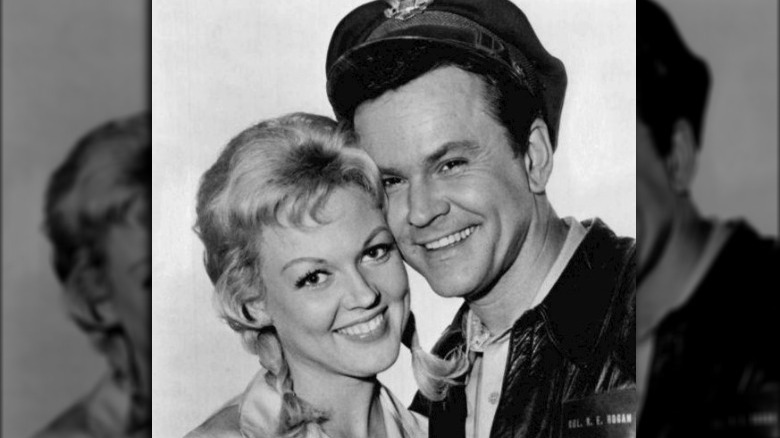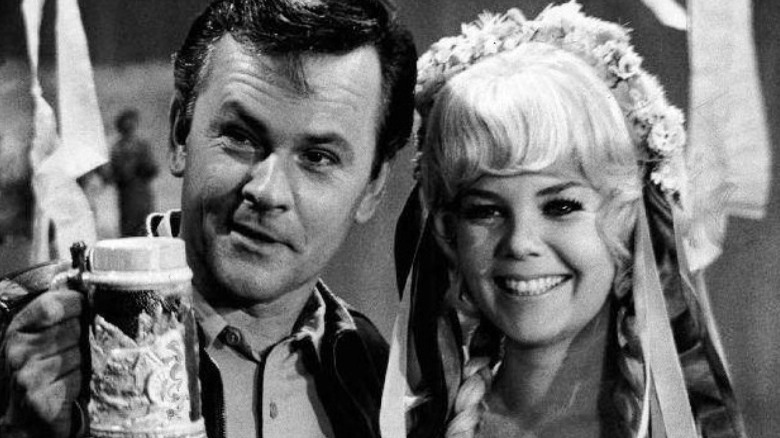Why Bob Crane's Murder Remains Unsolved
Before Mel Brooks and Taika Waititi were writing films ridiculing Nazis, "Hogan's Heroes" was one of the first and most popular programs that took the once feared Nazi regime and turned it into something to be mocked. According to Entertainment Weekly, when the show first aired in the fall of 1965, it was a departure from the contemporary sitcoms out at that time. Not only did it tackle real-life figures just two decades after the end of World War II and the defeat of the Third Reich, but the comedy saw its characters outwit their bumbling antagonists instead of simply reciting bad jokes to a laugh track. The program featured Jewish actors who in real life lost families in the Holocaust; cast member Robert Clary was forced into a concentration camp during the Nazi regime.
For the show's star, Bob Crane, "Hogan's Heroes" was the break he needed to go from a side character on well-known sitcoms to carrying one on his own. Understandably, Crane at first believed the show was a drama, seeing it takes place at a prison camp under the control of the Nazis. Still, Crane took to the role of Col. Robert Hogan and made the character a household name. But like so many other sitcom actors, the program that made him a superstar was the apex of Crane's career and it was followed by a steady decline. For Crane, this was exacerbated by his own demons before he was murdered in 1978.
Bob Crane had a sex addiction
Whether money and fame changed Bob Crane's personality or the actor was always obsessed with sex, and the money and fame were simply gas on a fire, investigators believe that the actor's sex addiction played an important role in his murder (per Entertainment Weekly). On the set of "Hogan's Heroes," other actors had only positive words for the show's star. During the show, despite being married to his high school sweetheart Anne Terzian, and having three children, Crane began an affair with two different actresses. One of the women, Patricia "Patti" Olson, eventually became his second wife shortly after Crane divorced his first wife in 1970.
However, even a new wife did not stop Crane from having numerous affairs. According to Reader's Digest, Crane had hundreds of sexual partners during his marriages. Still, this was not enough for the actor. With the help of a video equipment salesperson named John Henry Carpenter, Crane recorded his sexual escapades. The actor also took numerous photos of these affairs and compiled them into books. On the set of his 1973 film "Superdad," Crane showed photographs he took to people while filming. Soon, his private life became the subject of tabloids such as the "National Enquirer." Robert Crane, son of Bob Crane and his first wife, defended his father's sex life by saying all the women he videotaped or had pictures of were consenting adults (per Entertainment Weekly).
If you or anyone you know is struggling with addiction issues, help is available. Visit the Substance Abuse and Mental Health Services Administration website or contact SAMHSA's National Helpline at 1-800-662-HELP (4357).
John Henry Carpenter's Investigation and Trial
On June 29, 1978, Bob Crane was found murdered in his apartment in Scottsdale, Arizona (per Entertainment Weekly). His son, Robert, recalled his final conversation with his father. The elder Crane said he wanted to divorce his second wife and have people like John Henry Carpenter out of his life. During the investigation into Crane's murder, all the evidence pointed toward Carpenter. His rental car was stained with blood that was the same type as Crane. Also, according to Robert, Carpenter became enraged after his father ended their partnership. However, the lack of a murder weapon hindered the investigation. It also did not help that the crime scene was contaminated by Robert Crane and members of the actor's entourage because they walked around the apartment shortly after the murder.
It was not until 1992 that John Henry Carpenter was tried for Bob Crane's murder after unseen crime photos revealed brain tissue was found in the rental car. Still, DNA testing of the blood came back inconclusive, and a witness said that Carpenter and Crane were on friendly terms the night before the murder. Crane's own womanizing also led to theories an angry boyfriend could have committed the crime. Carpenter was acquitted in 1994. He died four years later, leaving the murder unsolved.
Speaking to Entertainment Weekly, Scottsdale detective Barry Vassall suggested that the outcome could have been different. "We did the best we could. ... A lot of times when you have an old case like that, it's very difficult to get a conviction. It would have been a slam dunk with the DNA testing," he said, underlining the lack of the technology in 1978.


